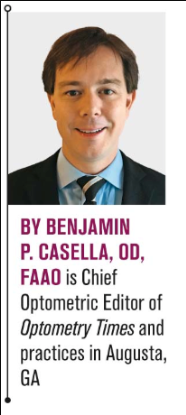Stick to medical facts, not opinions

Every so often a situation to which I am not accustomed presents itself to my practice.
After mentally going through the lexicon of my optometric education (at least the parts I am able to readily recall), I have to rely purely on common sense to solve the situation (or at least remove myself from it if I can).
With that said, a longtime patient of mine recently came in with a request I have seen numerous times but with an addendum I have yet to come across. He wanted me to write a letter saying that he is legally blind and that his legal blindness meant that he could not have tackled and hit the woman suing him for doing so.
Legally blind
First of all, he is legally blind due to complications from bilateral infectious retinopathy as a result of having HIV. So, that part of the letter is a no-brainer.
However, the question then becomes: Can a blind person tackle another person? Internally, my immediate response to this question was a resounding “Yes.” That is entirely possible.
I was not about to write a letter giving my opinion about whether blindness is an excluding factor for committing assault. I had not been called as an expert or character witness or anything of the sort.
So, I decided on the commonsensical and emotionless course of action: Stick to the facts.
Just the facts
He went on for a few minutes about the audacity of police or anyone to think that a blind person could do anything like this and then asked me “Don’t you agree?”
I paused for at least a full second before saying, “Well, your defense is that you are legally blind, and I have no problem writing and signing a letter stating that you are, in fact, legally blind and this means you have very, very poor vision.”
Fortunately, he was satisfied. I begged his pardon, went back to my office, and typed and signed a one-sentence letter explaining his visual status on my stationary. I made a copy for his record and gave him the original in an envelope. I wished him good luck and led him to the front of the office where a family member was waiting to escort him out.
At least in the arena of science, statements of opinion are the lowest form of evidence. In this situation, sticking to the facts at hand seems to have been the most sound and valid course of action. I hope he gets a good attorney, but I’m not it.